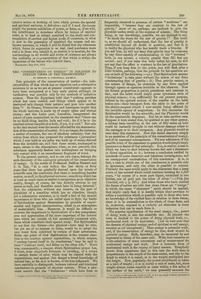The "Conservation of Energy" in Relation Certain Views of the Theosophists*
The principle of the conservation of matter—the indestructibility of that which has an objective and a substantive existence to us as we are at present constituted—appears to have been recognised at a very early period, although its verification was possible only by the methods of inductive science. Thus the Egyptians held that “nothing perishes which has once existed, and things which appear to be destroyed only change their natures and pass into another form.” † In Greece, Democritus and Leucippus taught that the whole universe is made up of empty space and eternal atoms; and the Latin poet, Lucretius, inaugurated the school of pure materialism by the statement that “there can be no third thing besides body and void; for if it be to the smallest extent tangible it is body, if hot, it is void.” But only in the last century were the means afforded for the demonstration of the conservation of matter. It is no longer, for instance, a matter of surmise, but one of absolute certainty, that the cotton from which was prepared the substance (pyroxyline) which I now hold in my palm was built up of atoms derived from the invisible air, and that these atoms, unchanged in mass, return to the atmosphere, when, as you perceive, this substance apparently flashes into nothingness on bringing into contact with it an incandescent fragment of wood.
To the present century, and to our own times, belongs the arch-discovery of the analogous principle of the conservation of energy. In the words of Professors Balfour Stewart and P. G. Tait, “It is only within the last thirty or forty years that there has gradually dawned upon the minds of scientific men the conviction that there is something besides matter, or stuff, in the physical universe; something which has at least as much claim as matter to recognition as an objective reality, though, of course, far less directly obvious to our senses as such, and therefore much later in being detected.” Now the admission, without any reserve, on the part of physicists of a something which has an objective, though not a substantive existence, is in itself a fact of the utmost importance to those who are called upon to fight the battle of Spiritualism against Materialism on grounds of experimental and logical demonstration, albeit in an atmosphere of materialistic bias. Moreover, it would be difficult to overrate the importance to Spiritualists of a due comprehension and appreciation of the more important of the natural laws which are outside of, but necessarily connected with, those which constitute their special study. For Spiritualists to say that the former—the physical—laws may be true, but yet are of no interest to them, would be to adopt the very worst form exhibited by certain of their adversaries, From one point of view Spiritualism is the counter reaction to the reaction against superstition, in which science, “casting beyond itself in its conclusions,” may be said to have “o’erleapt itself, and fallen on the other side.” There was, consequently, a danger, which Spiritualism proper has, I think, been singularly fortunate in avoiding, of a return to certain forms of error which may be classed with the superstitious, and against this danger a broad knowledge of natural law, so far as it is known, is the true safeguard. We have carefully to distinguish between rational and irrational conclusions on grounds of physical science. When a physicist asserts that the “levitations” which have been so frequently observed in presence of certain “mediums” are impossible, “because they are contrary to the law of gravity,” most -of us, perhaps, are inclined to give the physicist undine credit at the expense of science. The thing being,' to our knowledge, possible, we are inclined to say, “So much the worse for the law of gravity!” The truth is, as we should all understand, that the law of gravity is established beyond all doubt or question, and that it is in reality the physicist who has merely made a blunder. If you ask him, he will not deny that gravity may be overcome by any force capable of communicating to the “levitated” body, in one second, a velocity greater than 32 feet per second; and, if you raise this body before his eyes, he will not say that the effect is contrary to the law of gravitation. Thus, if you keep him to the: point, you will find, after a little trouble, perhaps, that the grounds for his assertion are one or both of the following:—(a.) That Spiritualists assume “levitations” to take place without the action of any force counteracting that of gravity; (b.) That gravity cannot, in the nature of things, be overcome by any force applied through agents or agencies invisible to the observer. Now the former proposition is purely gratuitous and contrary to fact, and the latter would imply gross ignorance even of physical science; it is, sufficiently for our present purpose, refuted by the upward motion of the needles on the table before you—their transport from the table to the poles of the electro-magnet (which I now excite) being effected by the invisible agency of magnetism. In this encounter the Spiritualist would be the scientific, and the Physicist would be the unscientific disputant. But let us take another case. Suppose it were stated that, by spiritual or any other agency, a railway train travelling at the rate of fifty miles an hour could be instantly brought to rest without damage either to the carriages or to their occupants. Any physicist would at once deny this statement. Now this denial amounts simply to an assertion of the principle of the conservation of energy, and of its necessary consequences. For any admission of the possible truth of the statement in question would simply imply ignorance or denial of that principle. It is, in reality, a case in which we have to elect between known fact and a statement in direct opposition to it; between a conclusion verified by hundreds of acute observers and laborious investigators, and an unsupported contradiction of this conclusion. It is, in fact, a case in which one of the conclusions is possible only to ignorance, and only the other is possible to science. Precisely the same would apply to the statement that a lamp exists or has existed which could continue burning for 1,500 years, “by means of a most pure liquor, contained in two bottles, one of gold and the other of silver.”—(Vide Isis Unveiled, vol. i. p. 227.) And when those who have studied the forces of nature are told that these forces are “beings” to which the name “elemental” spirit should be applied, they might reply that it is hardly within their province to refute a conclusion which is possible only to those who have no knowledge of the verified facts in relation to these forces, since it is in contradiction to the whole of these facts, and is, moreover, exposed to a reductio ad absurdum in every induction that can be made from it.
The popular signification of the word energy, viz., power of doing work, is also the scientific one. In physics the term is limited to the power of doing physical work, i.e., mechanical work or its equivalent. [Let us here note that the domain of physical energy, and of spiritual or will energy, remains as yet unexplored.] Thus energy is potential work, and, if the conservation of energy be true, work should be potential energy. Both, therefore, may be measured by and expressed in terms of the same unit. What first concerns us is the selection of some convenient unit of measurement for mechanical energy and work. Now a common form of mechanical work is the raising of heavy masses. Everybody knows from experience that in this case the work done is proportionate to the weight of the mass raised, and also to the height to which it is raised, or to the weight multiplied into the height. Now, popularly, the pound avoirdupois is taken as a unit of weight; it is in reality a unit of mass, but, since weight always varies sensibly as mass within a few miles of the surface of the earth,** we may generally measure the <... continues on page 7-136 >
* A paper read last Monday night before the British National Association of Spiritualists.
† Sir Gardner Wilkinson.
** At a height of 4,000 miles, the weight of 1 lb., or of 1 ton, would he about one-fourth, of the weight of the same mass at the level of the sea.
Editor's notes
- ↑ The "Conservation of Energy" in Relation Certain Views of the Theosophists* by Fitzgerald, Desmond G., London Spiritualist, No. 300, May 24, 1878, pp. 249-51
Sources
-
London Spiritualist, No. 300, May 24, 1878, pp. 249-51


